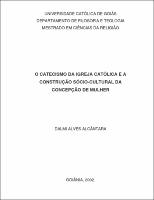| Compartilhamento |


|
Use este identificador para citar ou linkar para este item:
http://tede2.pucgoias.edu.br:8080/handle/tede/902| Tipo do documento: | Dissertação |
| Título: | O CATECISMO DA IGREJA CATÓLICA E A CONSTRUÇÃO SÓCIO-CULTURAL DA CONCEPÇÃO DE MULHER |
| Autor: | Alcântara, Dalmi Alves  |
| Primeiro orientador: | Ribeiro, Zilda Fernandes |
| Primeiro membro da banca: | Silveira, Marcos Silva da |
| Segundo membro da banca: | Swain, Tânia Navarro |
| Resumo: | Esta dissertação é o resultado da pesquisa, em que é apresentado o papel do Catecismo da Igreja Católica na construção sócio-cultural da concepção de mulher. Para traçá-lo, recorreu-se a aportes teóricos da filosofia, da história, da lingüística, mas, principalmente, da antropologia e da sociologia, gerando um embasamento teórico e metodológico interdisciplinar. Sustenta-se que a construção da concepção sócio-cultural de mulher, no catecismo, se dá pelo processo dialético de construção da realidade (exteriorização, objetivação e interiorização), que reproduz o substrato patriarcal, dualista e hierárquico da cultura e sociedade judaico-cristã ocidental. Como a cultura consiste na totalidade dos produtos materiais e não-materiais da humanidade, a sociedade e a religião estão entre esses produtos da atividade humana que atingiu o status de realidade objetiva a ponto de dirigir, sancionar, controlar e punir a conduta individual. Portanto, a construção da concepção sócio-cultural de mulher se dá a partir da interiorização pelos indivíduos de um conjunto de instituições e papéis dotados de realidade objetiva legitimada pela religião, através da sacralização. |
| Abstract: | This dissertation is the result of the research, in which is presented the role of the Catecism of the Catholic Church in the social-cultural construction of the conception of woman. To produce it, it was appealed you arrive in port it theoretical of philosophy, of history, of linguistics, but, mainly, of anthropology and sociology, generating a theoretical and methodologic interdisciplinary basement. The construction of the social-cultural conception of woman, in the catecism, occurs for the dialetic process of construction of the reality (externalization, objectivation and internalization), that reproduces the patriarcal, dualist and hierarchic substratum of the occidental Jewish-Christian culture and society. As the culture consists on the totality of the material and not-materials products of the humanity, the society and the religion are among these products of the human activity that has reached the status of objective reality guiding, sanctioning, to control and punish the individual behavior. Therefore, the construction of the social-cultural conception of woman happens because of the internalization for the individuals of a set of institutions and roles endowed with objective reality legitimated for the religion, through the sacralization. Key-words: Culture, Society, Social-Cultural, Religion, Catholic Church, Catecism of the Catholic Church, Gender and Woman. |
| Palavras-chave: | Cultura Sociedade Sócio-cultural Religião Igreja Católica Catecismo da Igreja Católica Gênero Mulher Culture Society Social-Cultural Religion Catholic Church Catecism of the Catholic Church Gender Woman |
| Área(s) do CNPq: | CNPQ::CIENCIAS HUMANAS::TEOLOGIA |
| Idioma: | por |
| País: | BR |
| Instituição: | Pontifícia Universidade Católica de Goiás |
| Sigla da instituição: | PUC Goiás |
| Departamento: | Ciências Humanas |
| Programa: | Ciências da Religião |
| Citação: | ALCÂNTARA, Dalmi Alves. O CATECISMO DA IGREJA CATÓLICA E A CONSTRUÇÃO SÓCIO-CULTURAL DA CONCEPÇÃO DE MULHER. 2002. 132 f. Dissertação (Mestrado em Ciências Humanas) - Pontifícia Universidade Católica de Goiás, Goiânia, 2002. |
| Tipo de acesso: | Acesso Aberto |
| URI: | http://localhost:8080/tede/handle/tede/902 |
| Data de defesa: | 31-Dez-2002 |
| Aparece nas coleções: | Mestrado em Ciências da Religião |
Arquivos associados a este item:
| Arquivo | Descrição | Tamanho | Formato | |
|---|---|---|---|---|
| Dalmi Alves Alcantara.pdf | 1,35 MB | Adobe PDF |  Baixar/Abrir Pré-Visualizar |
Os itens no repositório estão protegidos por copyright, com todos os direitos reservados, salvo quando é indicado o contrário.




